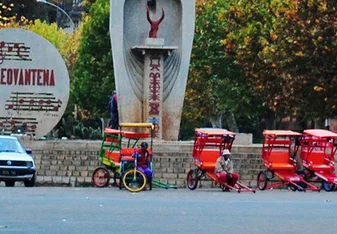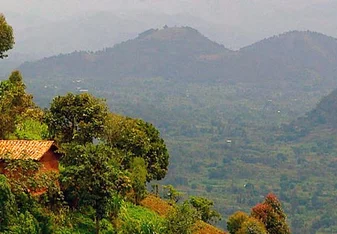Internships in Uganda
About
Winston Churchill, upon visiting Uganda in 1907, coined the name “the Pearl of Africa”, and it doesn’t take long for any visitor to this country to see the beauty that captivated him; in the land, the people, and the culture. More recently, following in the footsteps of Mr. Churchill, the Lonely Planet has named Uganda the top travel destination of 2012! What are you waiting for?
The country has made a remarkable comeback from the ravaged state left behind by Idi Amin in the late 1980s, and the stability and growth that has followed is easily identifiable in the bustling capital city of Kampala. Once out of the city centre however, you are greeted with lush rolling hills which eventually turn into the game-rich savannahs, thick rainforests, misty mountains (home to the gorillas), and of course, the vast Lake Victoria. Uganda’s tourism industry is far less developed than that of its East African counterparts of Kenya and Tanzania. This however, is what makes the county the ideal destination for a nature enthusiast, as one is able to truly explore the land without feeling like the sights have been marred by luxury resorts and hotels.
Top Industries
Though rich in natural resources, Uganda’s feeble industrial sector has contributed to the country being listed as one of the poorest in the world. Because of the lack of basic infrastructure available to the majority of the population (ie. running water, electricity, waste management, education, health care) there has been a definite increase in the number of organizations – both local and international- that have emerged to help improve the quality of life for the Ugandan people. This means that finding a suitable project to fit your area of interest should not be a challenge.
Typically, Internships in Uganda are within the not-for-profit sector, but the focus of the projects can range greatly from public health and HIV to environmental protection and sustainability. Options are especially abundant for those looking for a teaching position. If looking to intern in Uganda, be prepared for an un-paid internship. Typically not for profit organizations in Uganda are community based and strapped for funding, so offering a stipend is not always feasible. That being said, the cost of living in Uganda is relatively low, so volunteering will not burn too large a hole in your pocket if you’re willing to live within your means.
Those looking for paid internships should try looking through your home government foreign aid agency. These internships are typically a year long, and will often offer a stipend to cover accommodation and food costs.
Planning Your Trip
When and Where to Look for an Internship:
Depending on what you’re looking for, Ugandan internships are generally available throughout the year. Of course, if your visit is dependent upon the weather, it’s worth noting that the short rains run from April to May, and the long rains from September to November. While the showers can be a nice cool-down on a balmy day, if living or working in the city centre, the rains can be a huge hindrance due to the city’s poor drainage systems. Traffic literally stops, and pedestrians can often be forced to navigate through an obstacle course of foot-deep water-filled pot-holes. That being said, the rains never last for the entire day, and the storms are almost always followed by a warm blazing sun that dries up the ground once again. Perhaps your best bet is to invest in a sturdy pair of rain-boots and embrace whatever puddles come your way!
Visas for Interning in Uganda:
For those staying for less than 3 months, a tourist visa is sufficient and may be purchased upon arrival in Uganda for $US50. Those staying for longer may chose to renew their visa by purchasing a special pass*, or may chose to instead opt for a multiple entry visa for $US200 upon arrival, which is good for 6 months and allows you to leave and re-enter the country.
It is important that before arrival in Uganda, you obtain an International Inoculation Certificate against Yellow Fever. Though one is rarely asked to present it for inspection, it IS a strict requirement for the issuing of a Visa.
* A special pass allows you to extend your visa for another 2 months for the cost of $50 US. For more information, visit the Ugandan Ministry of Foreign Affrairs"
Cost of Living in Uganda:
The fact is, in Africa you can live cheaply or expensively, depending on the ‘little luxuries’ you are willing to forgo. One can live simply for $400/month (rent, food, transportation, entertainment), but be prepared to spend more if you’re looking for a more comfortable standard. Numbeo offers a good listing of Ugandan prices for everyday needs and luxuries.
Some Easy Ways to Cut Costs:
- Use public transport
- Bargain wherever possible
- Travel during the low season, and in groups
- Stock up on food or drinks in larger towns to avoid the high mark-up in hotels and touristy shops
- Eat local food
Work Culture in Uganda:
-
Etiquette: Ugandans take great pride in their appearance, and this is especially relevant at work. A suit is appropriate for men in formal situations, and women should avoid anything too tight or revealing.
As a highly communal culture, it is customary for Ugandans to ask questions about family and/or home life, even upon meeting for the first time. The same applies for business transactions or meetings; expect a fair amount of greetings, small talk, and sometimes even a prayer before the formal negotiations begin. Many Ugandans function on what they refer to as ‘African Time’. Meetings, both in social and formal business situations, will often start 30 minutes to an hour later than the agreed upon meeting time. Try not to get frustrated by this; understand that it is just a part of a more laid-back culture, and continue to do what you would do in your workplace at home.
- Language: If working within the city, expect for most offices to operate in English. In the smaller towns and villages however, it may be necessary to learn a couple key phrases in the native language (Luganda, Acholi, Nkole, depending on your region).
-
Networking: Mish Mash: An art gallery and Café in the heart of the city, Mish Mash is a hot spot for expats and others working in the NGO field. The café has special events most nights of the week, some of which are even industry specific (ie. ‘Green Drinks’ happens about once every two months, and anyone working in the fields of environmental activism or sustainability has the opportunity to meet like-minded people over a cocktail or two).
Expats in Uganda: This facebook group is incredibly useful to newcomers to Uganda, as well as those in the midst of planning their stay. Fellow expats post everything from sublet listings, art and culture events, cars for sale, and even available puppies for adoption!
Work and Labor Laws in Uganda:
If planning to work in Uganda (for pay), you’ll need to apply for a work permit. Most visitors will apply for their permit upon arrival in Uganda. You will need to bring the following documentation with you for your application:
- CV (resume)
- 2 passport sized photos
- Academic qualifications
- Police Clearance (From your local police)
- Copy of your passport
- Copy of birth certificate
- Depending on what type of work permit you are applying for, you may require additional documentation.






















